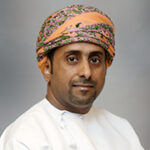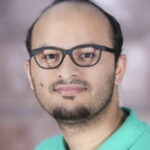Tutorials & Short Courses
Tutorial 1: MIMO Antenna Designs for 5G and 6G Technologies
Mohammed Bait-Suwailam
Sultan Qaboos University, Oman

Over the past ten years, Multiple-Input Multiple-Output (MIMO) and massive MIMO systems have shown promising advancement in terms of antenna designs, spectrum allocation, diversity strength, among many other features, which have resulted in increased channel capacity, robustness, and data throughput. In this session, we aim to attract high quality papers on the design and development of innovative MIMO and massive MIMO antenna designs with enhanced isolation capability and higher capacity for 5G and 6G technologies. We shall also target audiences from industry in this hot topic, due to its importance to both academia and industry. Furthermore, the topic on isolation enhancement in MIMO antenna systems is gaining much interest in the microwave and antenna community, which MIMO antenna structures need to ensure in order to maintain reliable far-field performance. The tentative list of research areas in this main session include but not limited to:
- Multi-band MIMO antenna designs
- Mm-Wave MIMO antenna designs
- Isolation enhancement between MIMO antenna elements
- High-profile MIMO antenna designs
- Low-profile MIMO antenna designs
- Massive MIMO antenna designs for base-station and mobile units
- Metamaterials/meta-surfaces for decoupling MIMO antenna elements
- Defected-ground structures for decoupling MIMO antenna elements
- Analytical studies of decoupling techniques for MIMO antenna designs
- Electromagnetic assessment of MIMO antenna handheld units in close proximity to human tissues
Tutorial 2: AI Enabled Nanoscale Communication and Sensing at Terahertz for Future Healthcare
Qammer H. Abbasi
University of Glasgow, U.K

Advancement in nanotechnology has made it possible to manufacture sensors, circuits and devices measuring only nano-meters in size. This development is creating an extraordinary opportunity to observe, interact, and optimize physical systems from the very bottom. Wireless communication and networking at nanoscale, however, faces new challenges not encountered in conventional sensor networks. For example, nanoscale antenna calls for wireless communication in the Terahertz band, which encounters new path loss d noise phenomena posing significant challenges for many target applications of such networking. Nanoscale computing and communication is a new and rapidly growing field of research promoting collaboration between wireless networking, nanotechnology, and other fundamental disciplines. However, the research is in its early stages to realize communication and networking at the nanoscale. Currently, there is no definitive standard that provides guidelines and regulation for nanoscale communication and networking. This motivates this proposal to shed light on and promote this area of research and foster.
The objective of this tutorial is to present the opportunities, challenges, and recent advancements of this new and growing inter-disciplinary field explicitly in healthcare and agricultural technology domains using terahertz frequencies. The focus will be on terahertz antenna design, nano-scale communication, and artificial intelligence.
At the end of this tutorial, attendees are expected to be well versed in describing and explaining concepts relates to the following challenge,
- Introduction to nano-scale communication and its applications.
- Different paradigms of nano scale communication e.g., molecular, electromagnetics etc.
- Terahertz antenna design challenges at nano-scale.
- Challenges in terms of nano-sensor design limitations of antenna and propagation prospective.
- Role of AI in nano-scale communication
- Future directions for research in the area of nano-communication.
- Industrial prospective and case studies (healthcare + agritech).
Qammer H. Abbasi (SMIEEE, MIET, FRET, FRSA), Dr Abbasi is a Reader with the James Watt School of Engineering, University of Glasgow, U.K., deputy head for Communication Sensing and Imaging group (110+ researchers), Program Director for Dual PhD Degree, deputy theme lead for Quantum &Nanotechnology in the University’s Advance Research Centre, Co-Manager for RF and terahertz laboratory and lead for healthcare and Internet of things use cases with Scotland 5G Center Urban testbed. He has grant portfolio of £6M+ and contributed to more than450+ leading international technical journal and peer reviewed conference papers and 10 books and received several recognitions for his research including URSI 2019 Young Scientist Awards, UK exceptional talent endorsement by Royal Academy of Engineering, Sensor 2021 Young Scientist Award , National talent pool award by Pakistan, International Young Scientist Award by NSFC China, National interest waiver by USA, University Research Excellence Award from TAMUQ in two consecutive years, Reward for Excellence from University of Glasgow, Research Culture award University of Glasgow, 8 best paper awards, Pakistan Award (for services to Antenna and RF community in Pakistan), Best chapter award2021 as chair from IEEE APS and IEEE MTT both, most downloaded paper in IEEE Terahertz Transaction, cover of MDPI journal twice, Editor’s choice paper from MDPI Sensor 2021, and best representative image of an outcome by QNRF. In addition, his work received media coverage by Analog IC tips, Microwaves & RF newsletters, Vertical news, Pakistan Dawn news, BBC news, Scotland TV, Fierce wireless, City42, Dunya news, Chinese news and many other media houses. Dr.Abbasi is an IEEE senior member and is chair of IEEE AP/MTT Scotland joint chapter and was chair of IEEE young professional affinity group. He is an Associate editor for IEEE Journal of Electromagnetics, RF, and Microwaves in Medicine and Biology, IEEE Sensors, IEEE Internet of Things, IEEE open access Antenna and Propagation, senior editor for Frontiers IoT and Sensors Networks section and acted as a guest editor for numerous special issues in top notch journals. He is a committee member for IEEEAPS Young professional, Sub-committee chair for IEEE YP Ambassador program, IEEE 1906.1.1standard on nano communication, IEEE APS/SC WG P145, IET Antenna & Propagation and healthcare network. Dr. Abbasi has been a member of the technical program committees of several IEEE flagship conferences and technical reviewer for several IEEE and topnotch journals and acted as TPC chair and executive chair for 4th, 5th and 6th international UCET conference 2019, 2020, 2021 in addition to EAI Bodynets 2021 General Chair. Dr. Abbasi is expert reviewer for UK National Commission for UNESCO’s, EPSRC and MRC UK (panel member, 2020), Qatar national research funds, Flemish funding council (FWO, panel member), Belgium, OSF Poland, British council, UAE and KSA funds. He serves regularly as organizer of conferences, special sessions, workshops and TPC member for several IEEE flagship conferences, in addition to reviewer for Wiley & Sons books, Springer, IET books, IEEE conferences and more than 30 leading journals including Nature. He is Fellow of Royal Society of Arts and Industrial fellow for Royal Academy of Engineering.
